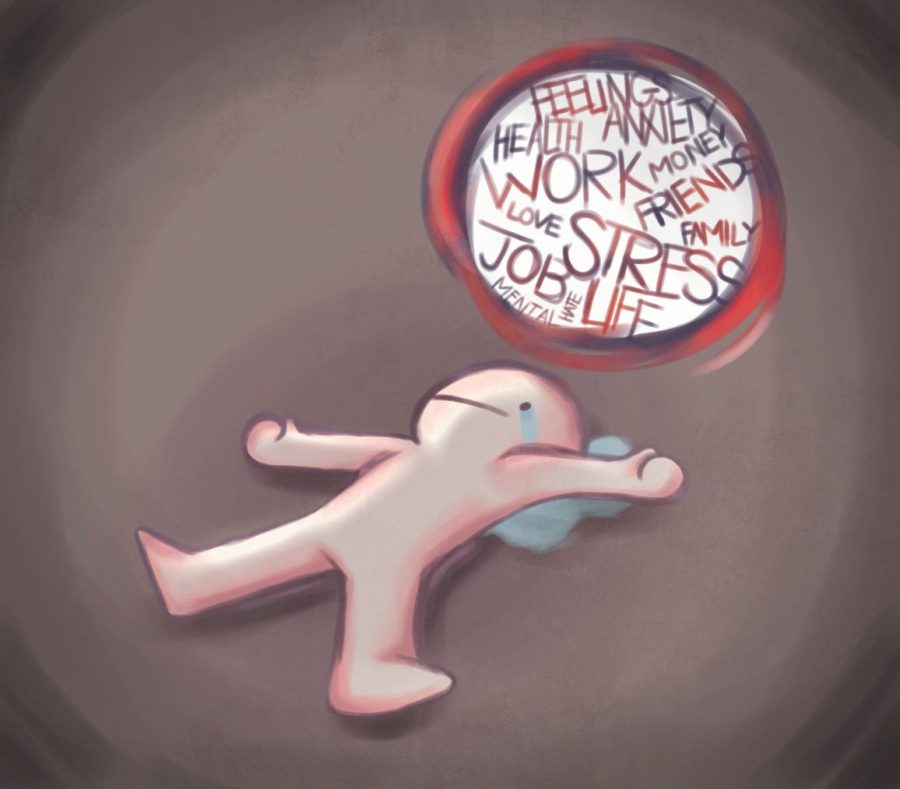Behind the Scenes of Stress
Stress can leave strong impressions on day-to-day life, especially in teens, where it can cause an abundance of different emotions that affect our mental and physical health. The buildup of stress can lead to many life-threatening diseases.
Stress leaves a major impact on students and may leave them stuck in place, not knowing what to do or how to handle it.
February 1, 2023
At the end of the first semester, students have been faced with long and burdensome stress due to tiring exams and long projects. The stress that forms can leave a big impact on a student’s life. It can reduce their mental and physical well-being as well as their emotional stability.
According to the Harvard T.H. Chan School of Public Health Student Association (HCSA), three types of stress can occur: acute stress, acute episodic stress, and chronic stress. Acute stress is stress that occurs over a small and brief period; the leading factors of acute stress are usually minor incidents such as arguments and criticism. Acute episodic stress is caused by more frequent occurrences such as deadlines. Chronic stress is long-term stress that immense sorrowful events can cause.
Common Stressors
Common stressors for students may include school work, jobs, relationships, social pressures, changes in life, and mental health. These common stressors can lead students to feel different emotions, as many people react to incidents differently.
According to research that was collected from the American Psychological Association, 40% of teens reported feeling irritable or angry, 36% reported feeling anxious, 36% reported feeling fatigued, and 31% reported feeling overwhelmed due to stress.
A common stressor that most students share is the fear that they will fail to succeed. Over 60% of teens feel significant pressure from this distress; senior Namrata Hari is one of those people. “I’m very academically driven,” Hari said. “During my underclassman years, I was constantly worried about not earning satisfying grades. After COVID, I learned that grades aren’t everything and that it is okay to not do well sometimes.”
How Can Stress Impact a Student’s Health?
Stress can impact one’s mental and physical health; it can cause irritability, aggression, insomnia, fatigue, exhaustion, headaches, memory problems, and feelings of loss of control. It can lead to other issues such as depression and anxiety.
School social worker Kim-An Tran works with students who are struggling with stress often. “Physical things affect your mental health because you’re not in the right space to be able to calm yourself, to be able to get to a baseline where you can be confident,” Tran said. “When you’re always stressed out, your body is going at 150 and it should be working at 100, and so, your mind is clouded. You’re not able to be resilient.”
Junior Alisha Jenkins has been juggling her academics as well as her personal life. “When I’m super stressed I tend to shut myself out from everyone, or my emotions get out of hand; sometimes, I get distracted,” junior Alisha Jenkins said.
Stress can also cause a change in eating habits. It can cause a person to eat more or less than their usual diet. When people are stressed, their body demands a greater amount of oxygen. But while in this tired and exhausted state, people may naturally seek highly processed foods such as candy and sweets, which can lead to long-term health problems such as diabetes, heart disease, and obesity.
The Psychology Behind the Curtains of Stress
History teacher Kevin Briscoe is one of the advisors for the Psychology Club here at Rock Ridge. “[When you’re stressed], there is a tendency to feel like you’re kind of alone sometimes, it’s just you that is facing that particular stress when in reality there are a lot of people facing [the same] stress and anxiety,” Briscoe said. “Oftentimes, [when stressed, students should] talk to an adult.”
The amygdala is a part of your brain that processes and controls fearful and threatening information. According to the research found by the University of California, Los Angeles, the process of putting feelings into words, or in other words, talking to someone, is known as “affect labeling,” which can help to reduce the response of the amygdala. This helps to decrease the amount of anxiety or stress placed on a particular object or thing.
Ways to Handle Stress
According to the Centers for Disease Control and Prevention, there are many different ways to cope with stress. Some healthy ways that students can use to deal with stress are taking breaks, taking care of themselves, talking with a friend or family member, and/or making time for themselves to relax.
In school, students can reduce their stress by participating in extracurriculars that they enjoy. Students like Hari take advantage of this. “My extracurriculars, like participating in Rock Ridge Sings events or attending my dance classes, tend to be my stress reliever from my academics,” Hari said.
Along with Briscoe, Tran also finds it helpful to talk with someone. “You might feel so stressed out because you have a lot of overwhelming feelings but from an outside person looking in, it could be so obvious to them [what’s going on],” Tran said.
Healthy ways to cope with stress are essential for students to use when they’re feeling overwhelmed or fatigued. If you or someone you know is looking for help with overcoming stress, seek out Tran, your school counselor, or check out this list of CDC recommendations for more tips on coping with stress.


























![The Phoenix varsity volleyball team lines up for the national anthem. “We were more communicative [with each other] during this game, and I feel like we kept our energy up, especially after the first set,” senior Jessica Valdov said.](https://theblazerrhs.com/wp-content/uploads/2024/10/DSC_0202-1200x800.jpg)









![Junior Alex Alkhal pitches the ball. “[I] just let it go and keep practicing so we can focus on our goal for the next game to get better as a team,” Alkhal said.](https://theblazerrhs.com/wp-content/uploads/2025/05/DSC_0013-1-1200x929.jpg)

























